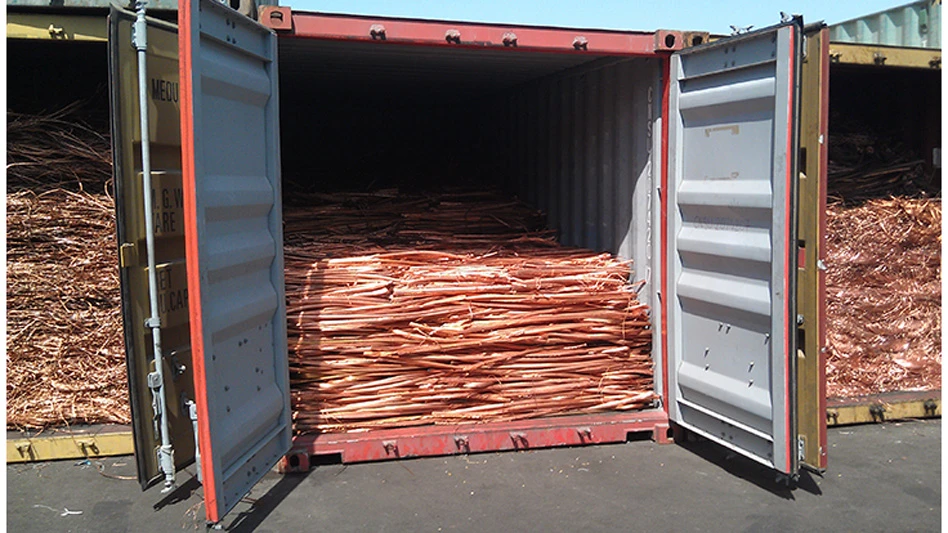
Recycling Today archives
A late October announcement made jointly by six agencies in China appears poised to increase the types of nonferrous recycled metal grades that can enter that nation’s ports. A few weeks later, however, a separate government announcement could trigger a slowdown in the production of aluminum, copper and copper alloys in the country.
The scrap-related joint announcement from China’s Ministry of Ecology and Environment is co-signed by five other agencies, including China’s General Administration of Customs (GACC), and was issued shortly before the Bureau of International Recycling (BIR) convened in Singapore.
The announcement (in Chinese) says the new rules were to take effect Nov. 15. Delegates to the BIR convention tell Recycling Today, however, that new rules involving inspection at Chinese ports can take much longer to be applied uniformly by agency personnel in the country.
While at times China’s inspection processes for scrap have been multilayered and considered unpredictable by traders, the October announcement indicates aluminum and red metals shipments may need only to pass a visual inspection starting this month.
“In addition to the inspection of radioactive contamination, which shall comply with the special inspection requirements of the [GACC], the inspection of recycled copper and aluminum raw materials shall first adopt sensory [visual] inspection," the announcement says. “When it is uncertain whether it meets the requirements of the attached table indicators, it shall be inspected in accordance with the corresponding inspection methods of the [GACC] technical specifications.”
Traders speaking to Recycling Today indicate the policy could open the door wider for brass scrap and other alloys, as well as a potentially looser definition of No. 2 copper.
Regarding mixed container loads, the Google Translate English translation of the notice reads, “When different categories of recycled copper and aluminum raw materials are independently packaged, they can be mixed, but they should be placed in categories.”
How quickly or uniformly the new directive is adopted will play out late this year and in early next year. The intention of the agencies, however, seems to be more accepting of the role of nonferrous scrap in China’s economy compared with earlier announcements that would refer to “foreign garbage.”
The announcement indicates the changes are being made to promote "the high-quality development of the recycled metal industry and standardize the import management of recycled copper and copper alloy raw materials, recycled aluminum and aluminum alloy raw materials.”
Recycled copper and aluminum raw materials that meet the requirements of the attached table do not belong to solid waste and can be imported freely, the announcement notes.
In mid-November, just as the new scrap import policy was taking effect, China’s Ministry of Finance announced it would cancel a finished and semifinished tax rebate often cited as contributing to overcapacity in China’s aluminum sector.
The December rebate repeal, which also applies to copper producers, caused London Metal Exchange (LME) aluminum pricing to rise last Friday, with traders perhaps seeing a better landscape in store for metals producers in other nations.
According to the Singapore-based Business Times, the tax rebate percentage was not uniform, but some producers received government rebates for up to 13 percent of the value of what they exported.
That publication quotes Netherlands-based ING Bank analyst Ewa Manthey as saying, “This could be seen as a strategic move in the context of trade tensions following Trump’s win in the United States presidential elections.”
According to the Business Times and Beijing Antaike Information Development, China exported about 5.2 million metric tons of semifinished aluminum last year. That equated to around 7 percent of the entire global aluminum market in 2023.
Latest from Recycling Today
- BMW Group, Encory launch 'direct recycling’ of batteries
- Loom Carbon, RTI International partner to scale textile recycling technology
- Goodwill Industries of West Michigan, American Glass Mosaics partner to divert glass from landfill
- CARI forms federal advocacy partnership
- Monthly packaging papers shipments down in November
- STEEL Act aims to enhance trade enforcement to prevent dumping of steel in the US
- San Francisco schools introduce compostable lunch trays
- Aduro graduates from Shell GameChanger program





